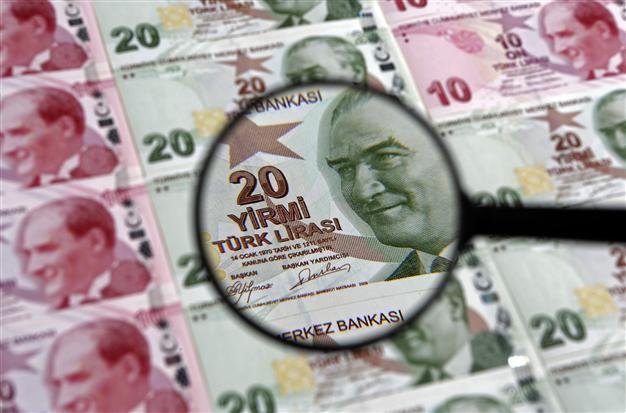Turkish lira near record low after AKP fails to win majority
ISTANBUL - Reuters

Reuters Photo
The Turkish lira tumbled to a record low and stocks were hammered on June 8 as investors fretted over the possibility of a minority or coalition government after the ruling Justice and Development Party (AKP) failed to win a majority in a parliamentary election.
The prospect of deepening political risk has further undermined investor sentiment on Turkey, already seen as an unattractive emerging market due to stalling economic growth, high debt levels and a heavy reliance on external financing.
With nearly all of the ballots counted, the center-right, Islamist-rooted AKP had secured just short of 41 percent of the vote, according to broadcaster CNN TURK. That will probably leave it struggling to form a stable government for the first time since it swept to power more than a decade ago.
“This is definitely the most uncertain of outcomes,” said Manik Narain, an emerging markets strategist at UBS. “It does open up the prospect of an early election and potentially there will be more friction in the AKP.”
The lira dropped 3.4 percent to 2.7530 to the dollar, paring some of its earlier losses when it hit a record low of 2.8094.
The lira’s relentless decline - it is down more than 15 percent this year - means further pain for construction firms and other companies with dollar-denominated debt.
It may also put pressure on the central bank to raise rates to keep inflation in check. The central bank has avoided tightening monetary policy, leading to concern about political pressure on policy.
Government bonds weakened, with the yield on the 10-year government bond rising to 9.7 percent from 9.21 percent on June 5.
Investors had been hoping the AKP would squeak by with enough votes to retain a single-party majority without handing Erdogan greater power.
Ratings agency Standard & Poor’s said the outcome of Turkey’s general election had no immediate impact on its BB+ sovereign credit ratings and that its current negative outlook reflects its view of the fiscal risks related to uncertain growth prospects.
Erdoğan, Turkey’s most popular but divisive modern politician, had hoped for a crushing victory for the AKP -- which he helped to found -- to allow it to change the constitution and give him broad executive powers.
Although Sunday’s result will help keep Erdoğan in check, it does not guarantee long-term political stability, Citi said in a note to clients.
“While the election outcome bodes well for containing the President’s increasingly non-consensual style and his dominance, we believe that the results are unlikely to bring lasting stability,” Citi said.
“The country’s polarized political landscape, the highly charged domestic agenda and difficult foreign policy issues are likely to distract the next government from focusing on the economy.”
The broadest measure of Istanbul stock performance slumped 5.9 percent to 77,199.43. Banks, the most liquid stocks and popular among foreign investors, bore the brunt of the pain, tumbling 7.5 percent.
However, shares of some companies were boosted.
Islamic lender Bank Asya, which was taken over by regulators last month and trades on a watch list, jumped 10.8 percent, the maximum it can gain in a trading session.
Bank Asya was set up by followers of U.S.-based cleric Fethullah Gülen, whom Erdoğan has accused of attempting to overthrow him, and its takeover is widely seen as connected to their row.
Media group Hürriyet Gazetecilik also rose 1.37 percent to 0.74 lira.
